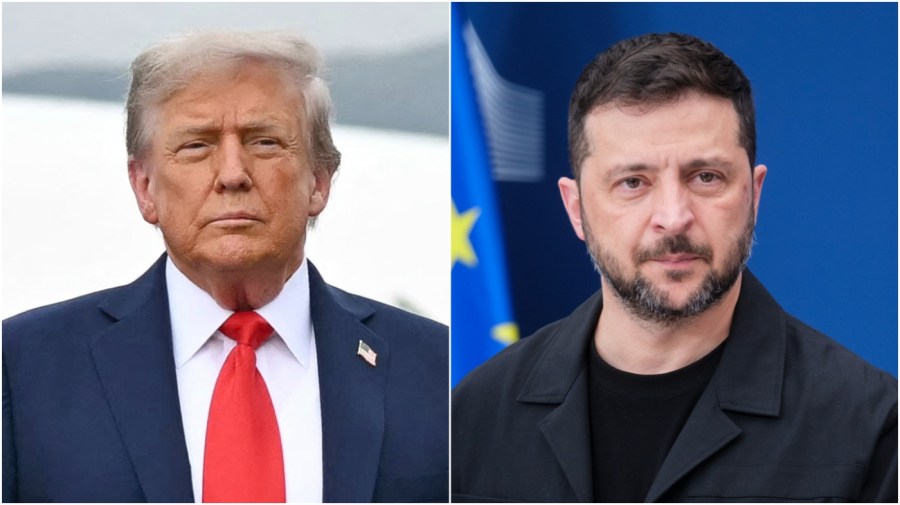Trump can still win the Nobel Prize if he helps liberate Ukraine

Last week, the Nobel Committee awarded its highly anticipated 2025 Peace Prize. It was not given to President Trump, who wanted it badly and touted his eligibility for the prize repeatedly.
Trump claimed, with substantial justification, to have resolved several long-running political or military conflicts around the world, the most dangerous of which was that between India and Pakistan, two nuclear-armed states. (The historic breakthrough in the Mideast happened after the Nobel decision was made.)
The recipient of the prize was María Corina Machado, a Venezuelan dissident who has bravely fought the corrupt dictatorships of Nicolás Maduro and Hugo Chávez before him. She is currently in hiding, but her candidate was clearly cheated out of the 2024 election as confirmed by election day records and independent international observers. Disappointed and deserving as he may be, Trump should refrain from ungracious recriminations against the Nobel Committee or demeaning Machado.
Instead, he should offer congratulations and praise her valiant fight against the Venezuelan tyrant whom Trump also wants to throw out of office. It would be an opportune time for him to start aligning his views with the world’s human rights and democracy heroes, as most American presidents have done and as Trump himself did in 2007 and 2008, when he lambasted Kim Jong Un for his brutal oppression of the North Korean people. Aside from being the right thing to do, it would enhance his prospects for winning the prize next year, as The Wall Street Journal editorialized.
Trump’s likely bitterness at what he sees as a deliberate Nobel slight may stem from the fact that Barack Obama, America’s first Black president, received the prize in 2007 after only 10 months in office. Nor did Obama further the cause of peace during his remaining seven-plus years at the White House. On the contrary, he set the stage for major conflict with two of America’s most dangerous adversaries.
Obama gave a green light to Vladimir Putin’s aggression in Ukraine and Syria when he told him in 2012 he could be “more flexible” after his reelection, tacitly tolerating Putin’s depredations in both places. Obama also passively accepted Xi Jinping’s assurance that China would not militarize its artificial islands in the South China Sea — and his almost immediate violation of that pledge. As a result of the Obama-Biden administration’s acquiescence to the expansionist ambitions of Russia and China, and Biden’s tragically shambolic withdrawal from Afghanistan, the U.S. now faces a metastasizing danger of war with emboldened foes.
For all his criticism of Obama, Trump did nothing during his first term to reverse Putin’s 2014 occupation of Ukraine. After he replaced Trump in 2021, Biden also let stand Russia’s seizure of Eastern Ukraine and Crimea. When Putin’s second invasion of Ukraine in 2022 exceeded the “minor incursion” Biden said was acceptable, he settled on a strategy of providing Ukraine with just enough weapons and permission to avoid its total collapse but not enough to reverse Putin’s invasion, resulting in yet another “forever war” of attrition, now in its fourth year.
For the first eight months of his present term, Trump followed Biden’s cruel and feckless stalemate policy. He twice suspended U.S. arms transfers to Ukraine to demonstrate to its elected president, Volodymyr Zelensky, that he “does not have the cards” to resist Russia’s ongoing invasion and occupation.
Then suddenly, Trump made a series of statements that seemed to signify a complete reversal of his defeatist policy on the Russia-Ukraine war. On Sept. 23, he declared that a purely defensive posture could not succeed in war or politics, and suggested that Ukraine must be able to strike deep inside Russia. He concluded soon after with his shocking statement that Ukraine could recover all the land Russia had seized “and perhaps even more.” Days later, he said the U.S. would provide Ukraine with intelligence to strike energy targets deep inside Russia and was considering its repeated requests for offensive Tomahawk missiles with a range of 2,000 miles.
But in the almost three weeks since, his administration has said he is still “considering” following through — and has so far done nothing more to implement this dramatic reversal of policy. Meanwhile, the grisly pattern continues: Ukraine holds back its offensive arms for fear of antagonizing Trump and provoking him into blaming it for Russia’s refusal to stop, while Russia escalates its attacks, this time destroying a power facility that provides light and heat to much of Kyiv as winter closes in.
Still, no Tomahawks have even been approved for Ukraine, let alone delivered as the weeks since Trump’s last deadline have slipped away. A bitter possibility emerges: that the Trump administration and Putin are coordinating their actions to produce decisive Ukrainian concessions and ensure a Russian advantage before the shooting stops, providing Russia the basis for further military advances when the opportunity presents itself and Ukraine’s death spiral proceeds.
If accurate, this scenario would reflect the most cynical betrayal of a wartime ally that any American president has ever perpetrated. Or, the answer may be childishly simpler — that Trump has just changed his mind again. Either way, conscious betrayal or utter ineptitude in the face of Putin’s intimidation, the consequences for Ukraine and many NATO nations are equally disastrous.
China, Iran and North Korea watch with as much interest as Russia. Less importantly, except to Trump, the Nobel Committee will not be impressed with his present course on Ukraine, unless they are inclined to call their award the Peace at Any Price Prize.
Joseph Bosco served as China country director for the secretary of Defense from 2005 to 2006 and as Asia-Pacific director of humanitarian assistance and disaster relief from 2009 to 2010. He is a nonresident fellow at the Institute for Corean-American Studies, a member of the advisory board of the Global Taiwan Institute and member of the advisory board of The Vandenberg Coalition.